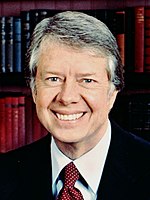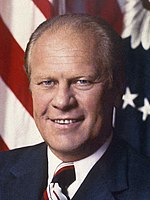
A | B | C | D | E | F | G | H | CH | I | J | K | L | M | N | O | P | Q | R | S | T | U | V | W | X | Y | Z | 0 | 1 | 2 | 3 | 4 | 5 | 6 | 7 | 8 | 9
This article needs additional citations for verification. (September 2023) |
| |||||||||||||||||||||||||||||
538 members of the Electoral College 270 electoral votes needed to win | |||||||||||||||||||||||||||||
|---|---|---|---|---|---|---|---|---|---|---|---|---|---|---|---|---|---|---|---|---|---|---|---|---|---|---|---|---|---|
| Turnout | 54.8%[1] | ||||||||||||||||||||||||||||
| |||||||||||||||||||||||||||||
 Presidential election results map. Blue denotes states won by Carter/Mondale and red denotes those won by Ford/Dole. Pink is the electoral vote for Ronald Reagan by a Washington faithless elector. Numbers indicate electoral votes cast by each state and the District of Columbia. | |||||||||||||||||||||||||||||
| |||||||||||||||||||||||||||||
The 1976 United States presidential election was the 48th quadrennial presidential election, held on Tuesday, November 2, 1976. Democrat Jimmy Carter, former Governor of Georgia, defeated incumbent Republican president Gerald Ford in a narrow victory. This was the first presidential election since 1932 in which the incumbent was defeated, as well as the only Democratic victory of the six presidential elections between 1968 and 1988.
Ford ascended to the presidency when Richard Nixon resigned in 1974 in the wake of the Watergate scandal, which badly damaged the Republican Party and its electoral prospects. Ford promised to continue Nixon's political agenda and govern as a moderate Republican, causing considerable backlash from the conservative wing of his party. This spurred former California governor Ronald Reagan to mount a significant challenge against him in the Republican primaries, in which Ford narrowly prevailed. Carter was unknown outside of his home state of Georgia at the start of the Democratic primaries, but he emerged as the front-runner after his victories in the first set of primaries. Campaigning as a political moderate within his own party and as a Washington outsider, Carter defeated numerous opponents to clinch the Democratic nomination.
Ford pursued a "Rose Garden strategy" in which he sought to portray himself as an experienced leader focused on fulfilling his role as chief executive.[2] On the other hand, Carter emphasized his status as a reformer who was "untainted" by Washington.[3] Saddled with a poor economy, the fall of South Vietnam, and the political fallout from the Watergate Scandal, including his unpopular pardon of Richard Nixon, Ford trailed by a wide margin in polls taken after Carter's formal nomination in July 1976. Ford's polling rebounded after a strong performance in the first presidential debate, and the race was close on election day.
Carter won a majority of the popular and electoral votes. He was able to carry several Midwestern and Northeastern swing states, as well as most states in the Democratic-dominated region of the South. Ford dominated the Western states. Carter's victory at the polls was due in part to the backlash against the Watergate scandal that still was deeply hurting Republican candidates. Ford became the only vice-president to become president and subsequently fail to win election for a term in his own right.
As of 2020, this is also the last election in which the Democratic candidate won the majority of states in the South, carrying the states of Alabama, Mississippi, South Carolina, and Texas (mainly due to Carter's southern roots), and the most recent election in which the losing candidate carried more states than the winning candidate.
Since the death of George McGovern in 2012, this is the earliest election where at least one of the major party nominees for president (Carter) or vice president is still alive. Ford died in 2006 and both Mondale and Dole died in 2021.
This is the only election in which all 4 major presidential and vice presidential candidates would be their party's nominee for president and lose. In addition to Ford losing this election, Carter would lose reelection to Reagan in 1980, Mondale would lose to President Reagan in 1984, and Dole would lose to President Bill Clinton in 1996.
Nominations
Democratic Party
| ||
|---|---|---|
|
76th Governor of Georgia
39th President of the United States
Policies
Appointments
Tenure
Presidential campaigns Post-presidency
 |
||
 | |||||||||||||||||||||||||||||
| Jimmy Carter | Walter Mondale | ||||||||||||||||||||||||||||
|---|---|---|---|---|---|---|---|---|---|---|---|---|---|---|---|---|---|---|---|---|---|---|---|---|---|---|---|---|---|
| for President | for Vice President | ||||||||||||||||||||||||||||
 |
 | ||||||||||||||||||||||||||||
| 76th Governor of Georgia (1971–1975) |
U.S. Senator from Minnesota (1964–1976) | ||||||||||||||||||||||||||||
| Campaign | |||||||||||||||||||||||||||||
 | |||||||||||||||||||||||||||||
| Candidates in this section are sorted by date of withdrawal from the nomination race | |||||||||||||||
| Jerry Brown | George Wallace | Mo Udall | Robert C. Byrd | Ellen McCormack | Walter Fauntroy | Walter Washington | Jesse Gray | Frank Church | Henry M. Jackson | Lloyd Bentsen | Milton Shapp | Fred Harris | Sargent Shriver | Birch Bayh | Terry Sanford |
|---|---|---|---|---|---|---|---|---|---|---|---|---|---|---|---|
 |
 |
 |
 |
 |
 |
 |
 |
 |
 |
 |
 |
 |
 |
 |
 |
| Governor of California (1975–1983) |
Governor of Alabama (1963–1967; 1971–1979) |
U.S. Representative for Arizona's 2nd congressional district (1961–1991) |
U.S. Senator from West Virginia (1959–2010) |
Chair of the New York Right to Life Party (1970–1976) |
Delegate to the U.S. House of Representatives for District of Columbia's at-large congressional district (1971–1991) |
Mayor of the District of Columbia (1967–1979) |
New York State Assemblyman from the 70th district (1972–1975) |
U.S. Senator from Idaho (1957–1981) |
U.S. Senator from Washington (1953–1983) |
U.S. Senator from Texas (1971–1993) |
Governor of Pennsylvania (1971–1979) |
U.S. Senator from Oklahoma (1964–1973) |
Democratic nominee for Vice President of the United States in 1972 |
U.S. Senator from Indiana (1963–1981) |
Governor of North Carolina (1961–1965) |
| Campaign | Campaign | Campaign | Campaign | Campaign | Campaign | Campaign | Campaign | Campaign | Campaign | Campaign | Campaign | Campaign | Campaign | Campaign | Campaign |
| LN: July 15, 1976 2,449,374 votes |
LN: July 15, 1976 1,955,388 votes |
LN: July 15, 1976 1,611,754 votes |
LN: July 15, 1976 340,309 votes |
LN: July 15, 1976 238,027 votes |
LN: July 15, 1976 10,149 votes |
LN: July 15, 1976 5,161 votes |
LN: July 15, 1976 3,574 votes |
W: June 14, 1976 830,818 votes |
W: May 1, 1976 1,134,375 votes |
W: May 1, 1976 4,046 votes |
W: April 27, 1976 88,254 votes |
W: April 2, 1976 234,568 votes |
W: March 16, 1976 304,399 votes |
W: March 4, 1976 86,438 votes |
W: January 25, 1976 404 votes |
The surprise winner of the 1976 Democratic presidential nomination was Jimmy Carter, a former state senator and governor of Georgia. When the primaries began, Carter was little-known at the national level, and many political pundits regarded a number of better-known candidates, such as Senator Henry M. Jackson from Washington, Representative Morris Udall from Arizona, Governor George Wallace of Alabama, and California Governor Jerry Brown, as the favorites for the nomination. However, in the wake of the Watergate scandal, Carter realized that his status as a Washington outsider, political centrist, and moderate reformer could give him an advantage over his better-known establishment rivals. Carter also took advantage of the record number of state primaries and caucuses in 1976, to eliminate his better-known rivals one-by-one.
Henry M. Jackson made a fateful decision not to compete in the early Iowa caucus and New Hampshire primary, which Jimmy Carter won after liberals split their votes among four other candidates. Though Jackson went on to win the Massachusetts and New York primaries, he was forced to quit the race on May 1, after losing the critical Pennsylvania primary to Carter by twelve percentage points. Carter then defeated Governor Wallace, his main conservative challenger, by a wide margin in the North Carolina primary, thus forcing Wallace to end his campaign. Representative Udall, a liberal, then became Carter's main challenger. He finished second to Carter in the New Hampshire, Massachusetts, Wisconsin, New York, Michigan, South Dakota, and Ohio primaries, and won the caucuses in his home state of Arizona, while running even with Carter in the New Mexico caucuses. However, the fact that Udall finished second to Carter in most of these races meant that Carter steadily accumulated more delegates for the nomination than he did.
As Carter closed in on the nomination, an "ABC" ("Anybody But Carter") movement started among Northern and Western liberal Democrats who worried that Carter's Southern upbringing would make him too conservative for the Democratic Party. The leaders of the "ABC" movement, Idaho Senator Frank Church and California Governor Jerry Brown, both announced their candidacies for the Democratic nomination, and defeated Carter in several late primaries. However, their campaigns started too late to prevent Carter from gathering the remaining delegates he needed to capture the nomination.
By June 1976, Carter had captured more than enough delegates to win the Democratic nomination. At the 1976 Democratic National Convention, Carter easily won the nomination on the first ballot; Udall finished in second place. Carter then chose Minnesota Senator Walter Mondale, a liberal, as his running mate.



